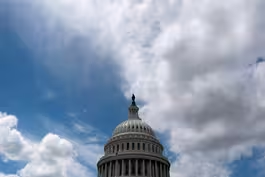
EPA rolls back limits on forever chemicals in drinking water
Clip: 5/14/2025 | 4m 8sVideo has Closed Captions
EPA rolls back Biden-era rules against 'forever chemicals' in drinking water
The Environmental Protection Agency announced a rollback of Biden-era regulations on PFAS chemicals in drinking water systems. The EPA estimates more than 158 million Americans are exposed to these "forever chemicals" through water. John Yang discussed the move with Amudalat Ajasa of The Washington Post.
Problems playing video? | Closed Captioning Feedback
Problems playing video? | Closed Captioning Feedback
Major corporate funding for the PBS News Hour is provided by BDO, BNSF, Consumer Cellular, American Cruise Lines, and Raymond James. Funding for the PBS NewsHour Weekend is provided by...

EPA rolls back limits on forever chemicals in drinking water
Clip: 5/14/2025 | 4m 8sVideo has Closed Captions
The Environmental Protection Agency announced a rollback of Biden-era regulations on PFAS chemicals in drinking water systems. The EPA estimates more than 158 million Americans are exposed to these "forever chemicals" through water. John Yang discussed the move with Amudalat Ajasa of The Washington Post.
Problems playing video? | Closed Captioning Feedback
How to Watch PBS News Hour
PBS News Hour is available to stream on pbs.org and the free PBS App, available on iPhone, Apple TV, Android TV, Android smartphones, Amazon Fire TV, Amazon Fire Tablet, Roku, Samsung Smart TV, and Vizio.
Providing Support for PBS.org
Learn Moreabout PBS online sponsorshipGEOFF BENNETT: The EPA has announced a rollback of Biden-era regulations on so-called forever chemicals, also known as PFAS, in drinking water systems across the country.
Our John Yang has more.
JOHN YANG: Geoff, the EPA has estimated that more than 158 million Americans are exposed to these chemicals through their drinking water.
Last year, the Biden administration set very low limits for six common PFAS contaminants in drinking water.
Now the EPA says it's rescinding and reconsidering the standards for four of them.
For the other two, the agency is giving water utilities two more years, until 2031, to meet the new limits.
Amudalat Ajasa covers environmental health for The Washington Post.
What are PFAS and how widespread are they?
AMUDALAT AJASA, The Washington Post: Yes, PFAS are a class of thousands of carbon-flying compounds used to repel grease, water, and oil, and they're the strongest bond in chemistry.
And they're really persistent.
I mean, they have the nickname forever chemicals for a reason.
JOHN YANG: And it's not just in drinking water.
Where else can it be found?
AMUDALAT AJASA: Scientists estimate that PFAS are in the blood of almost every American.
And they're found in remote regions around the world, even as far as Antarctica.
JOHN YANG: And is it in soil because it lasts so long?
AMUDALAT AJASA: It's in the environment.
It's in the air.
It's in the soil.
It's in the water.
But people are primarily exposed to PFAS in drinking water.
JOHN YANG: What does research say about the effect on human health of these things?
AMUDALAT AJASA: Yes, the effect of human health is pretty toxic.
PFAS, even at the smallest detectable level, are toxic to humans.
They're linked to a variety of cancers, including rare and reoccurring cancers, weakened immune systems, low birth rates, developmental delays, infertility, and much, much more.
JOHN YANG: And what does the EPA explain why they're doing this?
How do they explain it?
AMUDALAT AJASA: They were met with challenges from the water utilities and chemical manufacturers who said that the costs were too steep and that the time was too tight for them to comply with the standards.
They were given until 2029 to do so.
The EPA estimated that it would take them $1.5 billion each year to do so.
The water utilities were saying it's going to take more than that.
So the EPA is saying that they are keeping the deadlines for two of the more toxic and harmful chemicals that we know about, while rescinding and reconsidering four others.
JOHN YANG: And what do the environmental groups say about what the EPA is doing?
AMUDALAT AJASA: Yes, the environmental groups are pretty concerned.
The EPA is allowing -- is keeping the maximum containment for PFOA and PFOS, which are really toxic and known, but they have also been phased out in the U.S., right?
So these environmentalists are concerned that by rescinding and reconsidering the four others, some of which are substitutes for those other harmful ones, that the health effects could be amplified.
And on top of that, environmentalists are worried that the Safe Drinking Water Act has an anti-backsliding provision, which bars the agency from weakening the bill, so -- weakening the rules.
So this proposal, they say, could be in violation of that.
JOHN YANG: And this is just one of the many differences between the Biden administration and the Trump administration on this.
And, in addition, they're -- along with President Trump's goal of shrinking the federal government, they're going to be cutting budgets.
They're going to be cutting staff at the EPA.
What do people say are their concerns about the long-term impacts of that?
AMUDALAT AJASA: People are concerned about the health of Americans.
By cutting these agencies, by cutting the scientists who study this work, the health of Americans, they feel like, are in jeopardy.
JOHN YANG: Amudalat Ajasa of The Washington Post, thank you very much.
AMUDALAT AJASA: Thank you so much for having me.
How RFK Jr. is shaping the conversation about autism
Video has Closed Captions
Clip: 5/14/2025 | 12m 25s | How RFK Jr. is shaping the conversation about autism and why advocates are pushing back (12m 25s)
How Trump's meeting with Syria's leader is a turning point
Video has Closed Captions
Clip: 5/14/2025 | 10m 26s | How Trump's meeting with Syria's new leader is a turning point for the war-torn nation (10m 26s)
Port of LA head describes how tariffs are affecting imports
Video has Closed Captions
Clip: 5/14/2025 | 5m 53s | Port of LA head describes how Trump's tariffs are affecting imports (5m 53s)
'The Director' explores an artist in a time of trauma
Video has Closed Captions
Clip: 5/14/2025 | 6m 45s | New novel 'The Director' explores an artist's responsibilities in a time of trauma (6m 45s)
What's in the first draft of the GOP's 'big, beautiful bill'
Video has Closed Captions
Clip: 5/14/2025 | 5m 29s | What's in the first draft of the GOP's 'big, beautiful bill' cutting taxes and spending (5m 29s)
Providing Support for PBS.org
Learn Moreabout PBS online sponsorship
- News and Public Affairs

FRONTLINE is investigative journalism that questions, explains and changes our world.

- News and Public Affairs

Amanpour and Company features conversations with leaders and decision makers.












Support for PBS provided by:
Major corporate funding for the PBS News Hour is provided by BDO, BNSF, Consumer Cellular, American Cruise Lines, and Raymond James. Funding for the PBS NewsHour Weekend is provided by...




